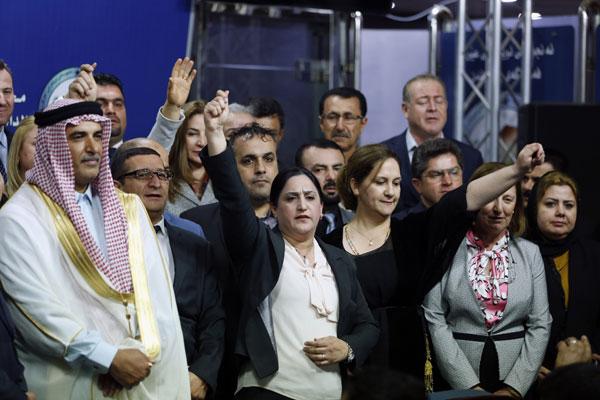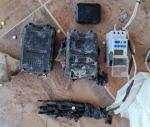You are here
Iraqi MPs vote to sack speaker, deepening political turmoil
By AFP - Apr 14,2016 - Last updated at Apr 14,2016

Iraqi lawmakers who attempted to oust the speaker of parliament gather during a news conference in Baghdad, Iraq, Thursday (AP photo)
BAGHDAD — Iraqi lawmakers voted Thursday to remove the parliament speaker and his deputies from office, increasing political turmoil as the country battles extremists and struggles with a financial crisis.
The chaos at parliament is a significant setback for Prime Minister Haider Al Abadi, overshadowing his efforts to replace the current Cabinet and preventing nominees from being brought to a vote.
The turmoil has escalated over three successive sessions this week: the first ended in a sit-in, the second with a fistfight among lawmakers, and the third with the vote to remove parliament speaker Salim Al Juburi.
Juburi, one of the country's leading Sunni Arab politicians, issued a statement saying that the session, which he did not attend, was unconstitutional and that the required quorum was not reached.
The session held “in the absence of the presidency of parliament is unconstitutional and lacked the necessary quorum”, the statement said.
But Niyazi Oghlu, the official responsible for taking roll at parliament, put the number of lawmakers present at 173, while two lawmakers also said more than 170 attended.
The main Sunni bloc condemned the effort to remove Juburi.
“These calls will lead to the end of the concept of political partnership and the principle of consensus on which the political process was based,” it said in a statement read out by MP Ahmed Al Misari.
Abadi has called for the party-affiliated cabinet to be replaced by a government of technocrats, but has faced significant resistance from the powerful parties that rely on control of ministries for patronage and funds.
An “emergency” session on Wednesday ended with lawmakers shouting, shoving and throwing punches in the parliament hall, leading Juburi to call a recess.
The speaker’s office said earlier in the day that Abadi was to give a revised list of nominees to parliament on Thursday, but the move to sack Juburi stole the spotlight instead.
Cabinet dispute
Abadi presented a first list of cabinet nominees at the end of March, but the political blocs put forward their own candidates, and most of the premier’s original list was replaced on a second presented to MPs on Tuesday.
Some MPs demanded the opportunity to vote on Abadi’s original list — from which at least two candidates had already withdrawn — but the session was adjourned on Tuesday without a vote.
Dozens of lawmakers then began a sit-in and spent the night at parliament.
Iraqi ministries have for years been shared out between powerful political parties that run them as their personal fiefdoms, relying on them for patronage and funds.
But even if the current Cabinet line-up is replaced with independent, technocratic ministers — a change that faces major obstacles — that would only be the beginning of the process.
Ministries are packed with lower-level employees appointed on the basis of party and sectarian affiliation, and replacing them would face serious resistance.
Technocratic ministers would also lack the political cover afforded by party affiliation, and could face threats by armed groups opposed to changes they proposed.
Abadi called in February for “fundamental” change to the Cabinet so that it includes “professional and technocratic figures and academics”.
That kicked off the latest chapter in a months-long saga of Abadi proposing various reforms that parties and politicians with interests in the existing system have sought to delay or undermine.
Sadr later took up the demand for a technocratic government, organising a two-week sit-in that put Abadi under pressure to act, but also supported the course of action he wanted to take.
Sadr relented after Abadi presented his first list of nominees at the end of March, but has yet to react to the most recent developments in efforts to replace the Cabinet.
The political crisis surrounding efforts to change the Cabinet comes as Iraqi forces battle to regain more ground from the Daesh terror group, which seized swathes of the country in 2014.
Iraq has also been hit hard by the plummeting price of oil, revenues from account for the vast majority of government funds.
Related Articles
BAGHDAD — Embattled Iraqi parliament speaker Salim Al Juburi on Tuesday announced the suspension of parliament sessions "until further notic
BAGHDAD — Iraqi cleric Moqtada Al Sadr ordered his followers to end a two-week sit-in on Thursday after the country's premier proposed new m
BAGHDAD — Iraqi Prime Minister Haider Al Abadi said he would present to parliament on Thursday his new Cabinet line-up aimed at fighting cor
















